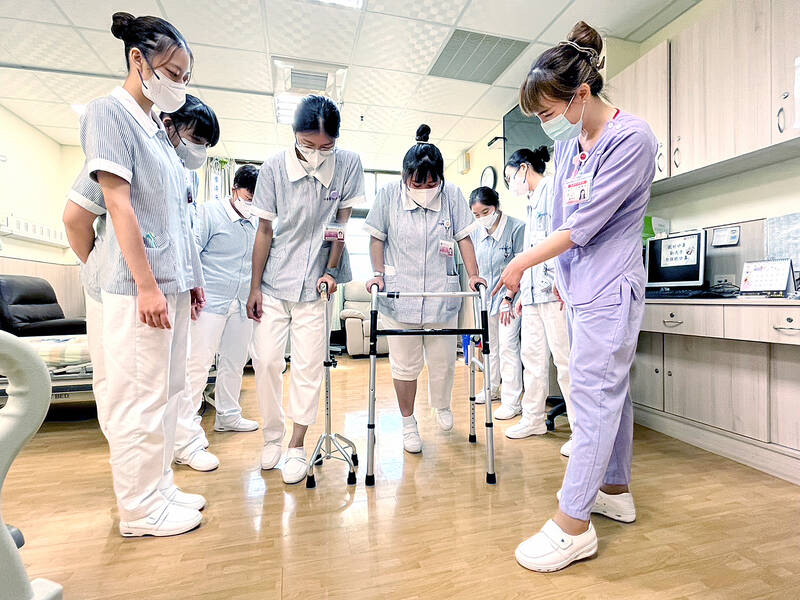The Executive Yuan yesterday approved a proposal to allocate NT$18 billion (US$557.8 million) annually over the next seven years to add at least 67,000 nurses to the workforce by 2030.
“Premier Chen Chien-jen (陳建仁) understands the challenges facing nurses, who are integral to the nation’s healthcare system, and deserve our respect and admiration. The Ministry of Health and Welfare should build a safe and reasonable work environment for nurses by improving their salaries, benefits and labor conditions,” Executive Yuan spokesman Lin Tzu-luen (林子倫) told a news conference following the weekly Cabinet meeting.
Based on the ministry’s presentation, Taiwan would need between 240,000 and 260,000 nurses between now and 2030 to meet healthcare demands.

Photo courtesy of Sinlau Christian Hospital
Ministry data showed that the nation has about 186,000 licensed nurses, implying a shortage of 55,000 to 74,000 professionals.
From this year to 2025, the ministry would set nurse-to-patient ratios for day shifts, night shifts and late-night shifts, and reward hospitals for meeting these ratios, it said.
Nurses working on night shifts would receive an additional subsidy of NT$400 to NT$600 per day, while those on late-night shifts would receive NT$600 to NT$1,000, the ministry said.
Nurses would see their monthly salaries increase by NT$8,000 to NT$20,000 if they work night shifts or late-night shifts for 20 straight days, it said.
Hospitals that meet nurse-to-patient ratios set by the ministry and create a nursing-friendly work environment would be given a bonus of up to NT$1 million, which should be used to reward nurses.
Apart from subsidies, the ministry aims to attract more people to become registered nurses by raising the percentage of nurses who are also civil servants.
Meanwhile, the government-administered tests for registered nurses would be held more frequently, and an integrated platform to educate, test and recruit registered nurses would be established, it said.
The ministry said that it would apply technology to reduce the workload for registered nurses, and that it would recruit clinical teachers for nursing novices.
The Ministry of Education is to allocate more funding and resources to nursing schools, the health ministry said, adding that it would begin enforcing inpatient integrated care plans at hospitals.
Implementing all the strategic plans proposed by the health ministry would require an annual funding of NT$18 billion in total, NT$2.5 billion and NT$3.5 billion of which would be used to offer additional funds for registered nurses working on night shifts or late shifts, and reward hospitals for meeting nurse-to-patient ratios.
The strategic plans, when implemented successfully, should increase the number of nursing professionals by 67,000 to 78,000 from next year to 2030, the ministry said.
The health ministry said it would negotiate over the funding for these plans when the Legislative Yuan reviews its budget proposals for the National Health Insurance System, adding that the nurse-to-patient ratios would be set by the end of December and implemented next year.

The CIA has a message for Chinese government officials worried about their place in Chinese President Xi Jinping’s (習近平) government: Come work with us. The agency released two Mandarin-language videos on social media on Thursday inviting disgruntled officials to contact the CIA. The recruitment videos posted on YouTube and X racked up more than 5 million views combined in their first day. The outreach comes as CIA Director John Ratcliffe has vowed to boost the agency’s use of intelligence from human sources and its focus on China, which has recently targeted US officials with its own espionage operations. The videos are “aimed at

STEADFAST FRIEND: The bills encourage increased Taiwan-US engagement and address China’s distortion of UN Resolution 2758 to isolate Taiwan internationally The Presidential Office yesterday thanked the US House of Representatives for unanimously passing two Taiwan-related bills highlighting its solid support for Taiwan’s democracy and global participation, and for deepening bilateral relations. One of the bills, the Taiwan Assurance Implementation Act, requires the US Department of State to periodically review its guidelines for engagement with Taiwan, and report to the US Congress on the guidelines and plans to lift self-imposed limitations on US-Taiwan engagement. The other bill is the Taiwan International Solidarity Act, which clarifies that UN Resolution 2758 does not address the issue of the representation of Taiwan or its people in

US Indo-Pacific Commander Admiral Samuel Paparo on Friday expressed concern over the rate at which China is diversifying its military exercises, the Financial Times (FT) reported on Saturday. “The rates of change on the depth and breadth of their exercises is the one non-linear effect that I’ve seen in the last year that wakes me up at night or keeps me up at night,” Paparo was quoted by FT as saying while attending the annual Sedona Forum at the McCain Institute in Arizona. Paparo also expressed concern over the speed with which China was expanding its military. While the US

SHIFT: Taiwan’s better-than-expected first-quarter GDP and signs of weakness in the US have driven global capital back to emerging markets, the central bank head said The central bank yesterday blamed market speculation for the steep rise in the local currency, and urged exporters and financial institutions to stay calm and stop panic sell-offs to avoid hurting their own profitability. The nation’s top monetary policymaker said that it would step in, if necessary, to maintain order and stability in the foreign exchange market. The remarks came as the NT dollar yesterday closed up NT$0.919 to NT$30.145 against the US dollar in Taipei trading, after rising as high as NT$29.59 in intraday trading. The local currency has surged 5.85 percent against the greenback over the past two sessions, central